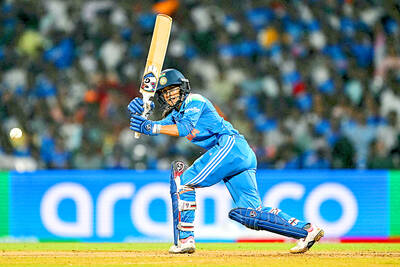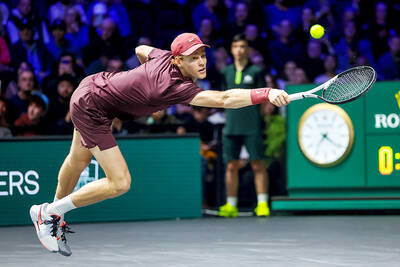NT$500 bills carry the image of Little League baseball players in a moment of glory. That’s how serious Taiwan is about its favorite game.
At a time when Taiwan’s professional baseball elite are shaken by game-fixing allegations, the nation stays devoted to its most popular sport because it is much more than just a pastime.
“Baseball is an important part of Taiwanese identity. People are proud of their baseball,” said Scott Simon, an anthropologist at the University of Ottawa who has done extensive research in Taiwan.

PHOTO: AFP
Taiwan is a highly diverse society but collective memories about baseball form part of the glue that holds it together.
“I remember when I was a little girl, perhaps five or six years old,” said Candy Lin, now 40, about the 1970s heyday of Taiwan’s participation in the Little League, a US-based organization that brings together players aged five to 18 from across the world for tournaments.
“When they were playing overseas, we’d get up in the middle of the night because of the time difference to watch our heroes live on TV,” she said.
Taiwan is not recognized by the vast majority of nations due to China’s efforts to isolate it internationally, and in this situation baseball is a crucial way to make its presence known.
The theory is that no society that can win the Little League World Series 16 times can be a nonentity, as Beijing claims.
One of the darkest moments in Taiwan’s history came in 1971, when the Republic of China on Taiwan was forced to hand over its seat in the UN to China.
“In the years right afterwards, baseball helped restore pride,” said Yu Chun-wei, a baseball expert at the National Taiwan Sport University in Taichung.
“Whenever Taiwan won the Little League, it meant enormous national confidence,” said Yu, who has written a book about the history of baseball in Taiwan.
When Taiwan was first introduced to baseball in the early 20th century, it was not a direct import from the US but came via Japanese colonizers.
The Japanese departed at the end of World War II in 1945, but they left behind baseball, much the way the British made cricket one of their lasting legacies in South Asia.
The Chinese Nationalist Party, which took over from the Japanese, were eager to eradicate most vestiges of the colonial period but soon gave up on baseball, finding it too firmly rooted.
Even so, the lukewarm Chinese attitude to the sport is reflected in the family backgrounds of most elite players even today.
“The majority of baseball players are Taiwanese, not descendants of people from the mainland [who fled China in the late 1940s],” Yu said.
Baseball underlines the differences between Taiwan and China, unlike the other globally successful US sport, basketball.
“Baseball is especially Taiwanese. Basketball is the opposite, because it’s also a big sport in the mainland. Basketball creates a commonality,” Simon said.
For all its popularity, Taiwanese baseball has had a tumultuous history, and the suspected game-fixing driven by high stakes illegal gambling now rattling the sport is just the latest in a series of scandals.
Prosecutors last month began investigations into alleged game-fixing in Taiwan’s professional league, the fifth time that a scandal of this type has emerged.
At least a dozen players have been named as defendants, while reports have pointed to links with notorious members of the island’s criminal underworld.
A legalized sports lottery began in May last year and sales reached nearly NT$8 billion (US$247 million) from January to July this year — with 60 percent of that accounted for by baseball.
Last year, Taiwan’s baseball league banned the dmedia T-Rex team over match-fixing allegations implicating the team’s management and three players, among others.
A scandal that erupted in 1996, the worst in the history of the sport in Taiwan, led to the disbanding of the China Times Eagles.
Despite the wave of bad news, observers believe the sport still has a future in Taiwan, citing the way it continues to attract genuine enthusiasm at the grassroots level.
“You see townships organize baseball games for the villages. Everyone loves it. It brings the communities together in a meaningful way,” Simon said.

US President Donald Trump’s granddaughter, Kai Trump, is poised to make her LPGA Tour debut after receiving a sponsor invitation on Tuesday to the Nov. 13 to 16 tournament at Pelican Golf Club in Florida. “My dream has been to compete with the best in the world on the LPGA Tour,” Kai Trump said in a statement posted on the LPGA’s Web site. “This event will be an incredible experience,” she said. “I look forward [to] meeting and competing against so many of my heroes and mentors in golf as I make my LPGA Tour debut.” The 18-year-old high-school senior,

REACTION: Less than 24 hours after a 18-inning Game 3 loss, the Blue Jays’ win ensured that the best-of-seven series is to head back to Toronto for Game 6 tomorrow Vladimir Guerrero Jr on Tuesday blasted a two-run home run as the Toronto Blue Jays bounced back to defeat the Los Angeles Dodgers 6-2 and tie the MLB World Series at two games apiece. Less than 24 hours after a shattering 18-inning Game 3 loss, the Blue Jays climbed off the canvas to breathe new life into their hopes of a first MLB title in 32 years. Guerrero’s two-run blast off Dodgers starter Shohei Ohtani and a superb pitching performance from ace Shane Bieber laid the foundations for a gutsy victory that silenced Dodger Stadium. “I’m always trying to compete

Jemimah Rodrigues on Thursday hit an unbeaten 127 as India pulled off a record chase of 339 against Australia to set up a Women’s World Cup final against South Africa. Rodrigues and skipper Harmanpreet Kaur, who hit 89, put on 167 runs for the third wicket as India won with nine balls and five wickets to spare at DY Patil Stadium, on the outskirts of Mumbai. The hosts finished on a total of 341-5 in reply to Australia’s impressive 338 and ensured there would be a new name on the 50-over trophy tomorrow. Amanjot Kaur hit the winning boundary to trigger wild celebrations

Jannik Sinner on Thursday eased past Francisco Cerundolo 7-5, 6-1 at the Paris Masters to set up a quarter-final clash with Ben Shelton, while reigning champion Alexander Zverev earned a straight-sets win over Alejandro Davidovich Fokina in the third round. A maiden crown in the French capital would return Sinner to No. 1 in the world rankings after current incumbent Carlos Alcaraz suffered a shock early exit at the hands of Britain’s Cameron Norrie. The Italian four-time Grand Slam champion is yet to drop a set in the tournament as he hones in on what would be a fifth title of the